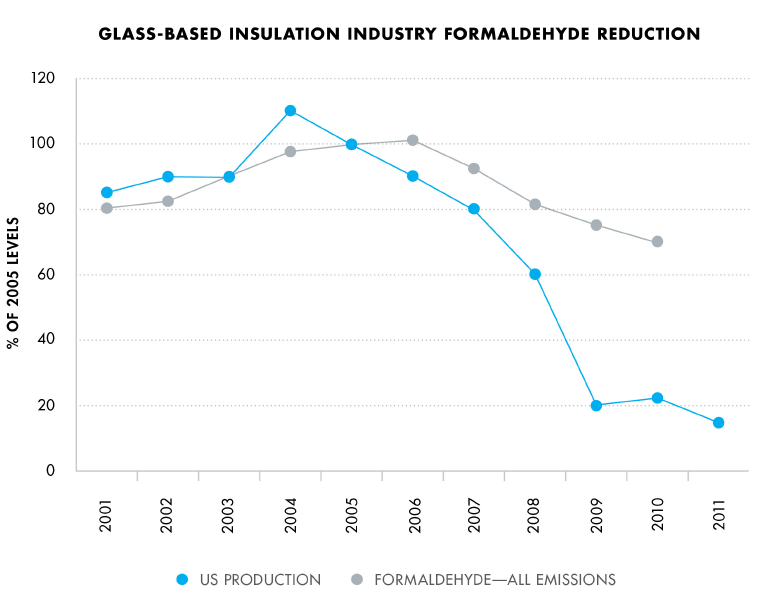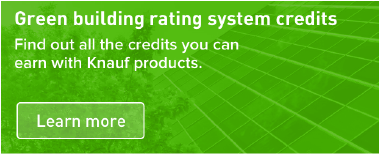How we make it greener Black Acoustical Board and Acoustical Smooth Board

Utilize recycled content
Our plants use 60 – 80% recycled content – which translates to about 10 railcars of recycled glass cullet a day. By leveraging so much recycled content, we reduce the energy required to form glass fibers by 20%. If we use even 60% recycled content, then mining impacts are reduced proportionately.
Pursue sequestration potential
Manson and Knauf's bio-based ECOSE Technology is derived from corn. On average, the Knauf Family Farm produces one half the amount of corn we use to make our products on an annual basis, which is equal to 5,000 acres. While we don’t grow the corn used in our products, the use of corn has a significant carbon sequestration impact on our processes. For instance, the use of corn actually offsets the carbon impact of some of the ancillary facers used on our products.

Develop bio-based formaldehyde-free binder
In 2008, Manson and Knauf Insulation launched perhaps the nation’s largest formaldehyde-free green chemistry initiative called ECOSE Technology. Offering this into the building materials marketplace quickly transformed the entire glass mineral fiber industry toward bio-based chemistries. Today phenol-formaldehyde (PF) based resins are largely a thing of the past with regard to large volume mineral fiber based insulation products. Manson and Knauf have also launched a new business venture to assist other industries in accessing ECOSE Technology for their processes.
In a given year, using corn-based ECOSE Technology instead of phenol & formaldehyde avoids the equivalent of more than 100,000 barrels of oil in North America alone.

Lead green chemistry efforts
Following the launch of our ECOSE Technology in 2009, we had transformed all of our products and processes to this new technology. Using our bio-based ECOSE Technology has removed phenol and formaldehyde from our stack emissions. By 2012, the entire industry had followed our lead. This initiative not only established Manson and Knauf Insulation in a leadership position, but it had a transformative impact on our industry in general.

Green manufacturing Processes
1. Regenerative thermal oxidizers Manson and Knauf Insulation use regenerative thermal oxidizers (RTO) to capture and recycle much of the energy we used to cure our products. RTO is equipment used for the treatment of exhaust air. Our ovens exhaust into a ceramic heat exchange media to capture and reuse the heat in the exhausted air. Therefore, the amount of energy required to cure our product is reduced substantially.
2. Recycling As you can see below, everything we do starts with recycling. Our plant uses as much as 80% recycled content. While our only option is to landfill our products at end of life, that doesn’t stop us from encouraging consumers to recycle other products, particularly glass bottles.


Continuous Improvement
Continuous improvement is key to our sustainable development. Globally, we maintain the following Bureau Veritas certifications: ISO 9000, 14000, and 50001. These certifications relate to quality management systems, energy management and environmental management efforts. For more information on our current continuous improvement efforts, please review our global sustainability report.

Leverage compression packaging
Glass is a high modulus material, which helps to facilitate compression packaging. We compress our insulation to fit up to five times more product on every truck. This compression means:
- More material can fit on one truck when compared to other insulation materials
- Fewer packages on a job
- Fewer deliveries needed


Be confident in glass mineral wool's safety
In the past, a label regarding the carcinogenic potential of insulation made from glass fibers was required on all packaging. Following forty years of research, glass mineral wool has been exonerated entirely. Glass mineral wool is comprised of fibers that are biosoluble, meaning that the fibers dissolve in the body in a short period of time and exit the body with normal bodily functions. The scrutiny glass mineral wool has undergone is now seen as proof of its safety.
Meet and exceed green standards
GREENGUARD certified On the forefront of indoor air quality,
Knauf Insulation was the first GREENGUARD certified product in
2002. This achievement led us to understand the impact our
formaldehyde-free products could have on the indoor
environment. The formaldehyde-free claim is third party
validated by UL Environment.
Red List Free Since 2012, Knauf Insulation North America
used the Living Building Challenge (LBC) Red List as its
developmental benchmark. The Red List is a list of chemicals that
are avoided in material imperative for the construction of LBC
buildings. Formaldehyde is just one of about 800 chemicals on
the Red List. Manson Insulation has chosen the Health Product Declaration® (HPD) Collaborative as its standard for reporting building product content and associated health information.
EUCEB tested Glass fiber is perhaps the most widely studied building material available today. All of our processes and formulations are voluntarily third-party audited for compliance with the health and safety exoneration criteria for glass and rock based fiber through the European Certification Board for Mineral Wool Products (EUCEB) exoneration process. This guarantees the formulations are biosoluble and pose no health concerns. Having 35 years of research behind its safety, perhaps no other building material has been as thoroughly evaluated as fiberglass products. We believe a safe product is one that has been thoroughly evaluated.
Green building rating systems
Our products offer a vast array of potential credits for major green building rating systems, including: WELL, LEED v4, International Green Construction Code, Green Guide for Heath Care, NAHB Green Building Standard and more.
Visit the green building rating systems page to see all the credits you can earn using Manson and Knauf Insulation products.

Promote Recycling
Manson and Knauf are recycling advocates. We take every opportunity to advocate for recycling and financially support the Glass Recycling Coalition (GRC). We feel that a comprehensive understanding of the benefits of recycling will lead to greater recycling adoption and more promotion by state and local governments. While our only option is to landfill our products at end of life, that doesn’t stop us from encouraging consumers to recycle other products, particularly glass bottles.



 SM Transparency Report (EPD)
SM Transparency Report (EPD) 